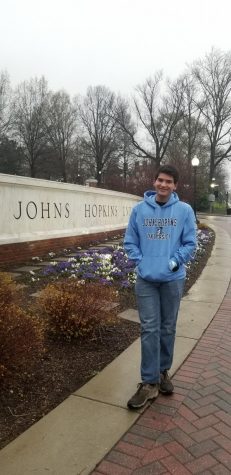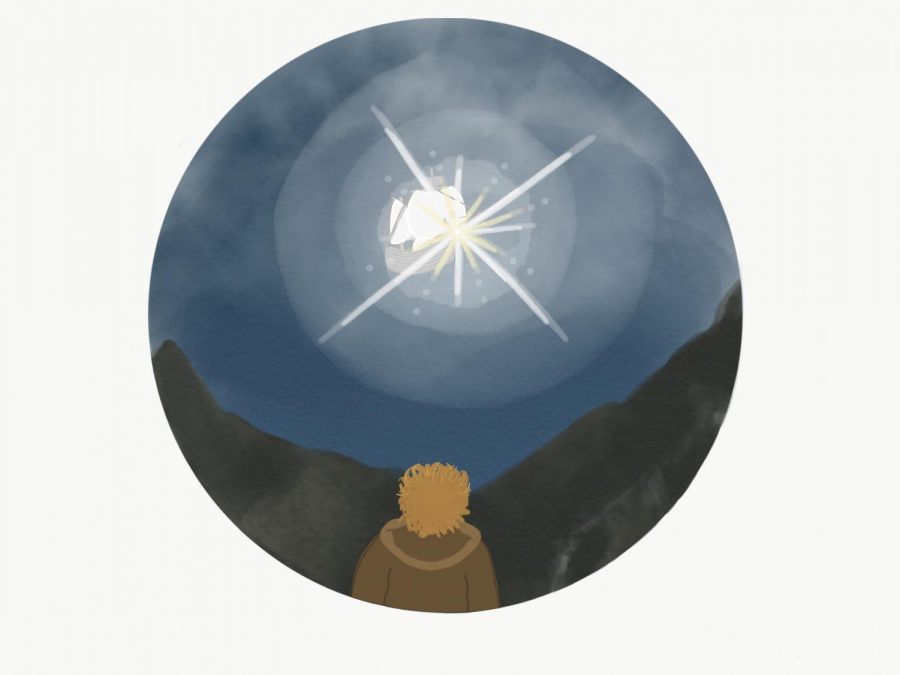Senior Column | Above all shadows: Fighting the Long Defeat
Sam sat in the darkness. Amidst by the plains of Gorgoroth, stranded a world from hearth and home, staring at the great fires of the mountain before him. Those fires, issued from Orodruin, marked both salvation and defeat.
He looked down at Frodo lying in the brambles—his master, his friend, his companion. He looked back at the mountain, then towards the West. Past the Ephel Dúath, Strider fighting for Gondor, Merry and Pippin with him; beyond that, Rosie danced in Bywater. A wind blew and, ‘there, peeping among the cloud-wrack above a dark tor high up in the mountains, Sam saw a white star twinkle for a while. The beauty of it smote his heart, as he looked up out of the forsaken land, and hope returned to him. For like a shaft, clear and cold, the thought pierced him that in the end the Shadow was only a small and passing thing: there was light and high beauty for ever beyond its reach.’
I remember very little from my early life, but I cannot forget the time when my father sat with me on that old, blue couch and opened a worn, green book. I nustled against him, listening to him begin, ‘In a hole in the ground there lived a hobbit. Not a nasty, dirty, wet hole… it was a hobbit-hole, and that means comfort.’
In that place, I was comforted. I didn’t know why I felt so entranced by the story of a simple hobbit falling by chance meeting into a great adventure, but I was. After we finished The Hobbit, my dad read me The Children of Húrin, a great tragedy from the Elder Days. The next day, I picked up The Lord of the Rings, knowing only that it answered: “Why Gandalf disappeared when Bilbo entered Mirkwood.” I haven’t put it down since.
‘High above the black plains of Udûn, Eärendil, the great Peredhel mariner of old, sailed through the heavens. He, on his boat Vingilótë, had been bound by the Valar to ‘sail the shoreless skies… to bear his shining lamp afar, the Flammifer of Westernesse.’ Upon his brow shines a Silmaril, one of those ‘thrice-enchanted globes of light that shine until the final night;’ the last remnants of the Two Trees and the Noontide of Valinor.
He looked down upon the mountain of flame, sending a ray of light through the darkness. Without tarrying, he passes over the mountains towards the Uttermost West. There, he sees her again: Elwing, his wife, his beloved, in the form of a great bird. ‘As a white cloud exceeding swift beneath the moon,’ she passes to him as she did millennia ago. Embracing, he asks:
“Do you yet regret the choice you made, all those ages ago?”
“Never. As I said then, ‘all thy perils I will take on myself also.’”
In the long years since I first left Bag End, everything has changed. That couch where I felt at home has passed away, so has that house, those friendships, that life. For a long while, certainly, through my first years at ETHS, I felt hopeless. I believed that ‘be a Man strong, or swift, or bold; be he wise or a fool; be he evil, or be he in all the deeds of his days just and merciful, let him love the world or loathe it, he must die and must leave it.’ I had ‘no certainty and no knowledge, only fears, or dreams in the dark,’ knowing only that ‘to evil end shall all things turn that they begin well.’ The world was as Galadriel famously lamented to Frodo under the starlight, nothing more than a ‘long defeat…[everything] fad[ing], and the tides of Time [sweeping] it away.’
Beneath a great hall of stone and iron, Beren and Lúthien Tinúviel wove their way through the dark prisons of Angband. As they approached the throne of the Dark Lord, Beren looked into her eyes, as he had years prior in the beech forests of Neldoreth; then, as now, he saw the stars shimmering. From that first moment, dancing between the hemlock sheaves, ‘he began the payment of anguish for the fate that was laid on him; and in his fate Lúthien was caught, and being immortal she shared in his mortality, and being free received his chain.’ They entered into this darkness together; they would leave it together.
Finally, they strode before the great throne and, in the greatest feat ever attempted by elf or man, Lúthien began a ‘song of such surpassing loveliness, and of such blinding power, that… blindness came upon [Morgoth], as his eyes roamed to and fro, seeking her.’ There, ‘before his feet he saw amazed the gems of Fëanor, that blazed with white fire glistening in the crown of Morgoth’s might now fallen down…. thus out of bondage came at last, from iron to mortal hand it passed.’ The light glistened in his hands, and he looked once more at his love Tinúviel… 500 years of war had not won the Silmarils, yet from his love for her and her love for him there was leithian, release from bondage.
For the gem, for her, for him.
I don’t know when this sentiment changed, but it has to line up pretty closely with my return to Tolkien’s world. After journeys far from Arda, I picked the books back up during my sophomore year and felt refreshed by them. They rang differently than they had when I first encountered them, but not for differences within. Around this time, I began to understand who I was and who I wanted to be; not a selfish, self-centered person—though I falter—but a person driven by compassion, pity and love.
I was able to immerse myself in this love, finding communities that echoed the love I had for them. From the ETHS Math and Scholastic Bowl teams to the ChemPhys classroom to the Evanstonian. In each of these places—the last greatest of all—I felt love and connection. The hardness that had long held me back began to thaw; slowly, and then all at once, the desire for power, popularity, influence faded. I no longer sought for those things, perceiving that they would ‘drive [me], and yet betray [me], and ever snatch away the very treasures that [I had] sworn to pursue.’
It was at this point, I realized why I loved the world that Tolkien had created.
Two generations before Beren wrested a Silmaril from the Iron Crown, Andreth, a wise woman of the House of Bëor, sat beside the waters of Tarn Aeluin with the elven-king Finrod Felagund. They spoke of many things: of the forbidden love between Andreth and Finrod’s brother Aegnor, of the history of the Eldar and the Edain, of the war waging around them. Yet, of all things, it was the love of Eru Ilúvatar, ‘that one ever-present Person who is never absent and never named,’ for his children that they spoke.
In those days, they spoke of ‘the greatest moment [hidden by the writer] until it comes in due course,’ when ‘the One will himself enter into Arda, and heal Men and all the Marring from the beginning to the end.’ Such a hope was not one that Finrod or Andreth could imagine, laying beyond the knowledge of the Quendi, the Edain and, even, the Valar, yet it was one that came ‘from [their] nature and first being. If we are indeed the Eruhín, [Finrod spoke,] the Children of the One, then He will not suffer Himself to be deprived of His own, not by any Enemy, not even by ourselves…. of all His designs the issue must be for His Children’s joy.’
As night fell over Dorthonion, Finrod and Andreth gazed into the lake and ‘while the Shadow still brood[ed] in the North [they were not] wholly afraid.’
I love Arda—not for the stories of dragons or of war, of grand heroism or of powerful magic—but for the truths that it contains. While I don’t believe that Turgon fell beneath the Tower of Gondolin or that Fingolfin dealt Morgoth seven blows or that Elendil led nine ships from the downfall of Númenor, I do believe in the world that Tolkien created. Arda is only a myth, but there is nothing more powerful than a myth. ‘There is no firmament, only a void, unless a jeweled tent myth-woven and elf-patterned.’ The mythmaker takes a world in chaos and imposes order upon it, giving it meaning and life. The mythmaker looks at the shattered light of the world, reassembles it and propounds that, in the end, the Creator will act to restore that which He has built. That the author cannot leave the story unfinished.
Tolkien is the ultimate mythmaker; a writer who captured the chaos and darkness of the world, a world that has been marred from the beginning until the end, yet which need not be meaningless. The task that Tolkien sets before his characters is not one of battles—after all war did not win the Silmarils or destroy the Ring—but one of small victories, of fighting the Long Defeat, despite knowing the outcome, through acts of love and mercy.
As for Sam, who sat beneath the darkness, who saw the light of Eärendil pierce the clouds above him, a light that was carried across the sea by Elwing’s love for the Free Peoples, that was freed from the Iron Crown by the love of Beren and Lúthien, that was created by the Valar for their world, that has its source in the Secret Fire begotten by Eru into each and every one of us. He was not afraid; he did not fear the dark, foreseeing that ‘above all shadows rides the sun.’
Tolkien describes two types of hope: amdir and estel. Amdir: an ‘expectation of good, which though uncertain has some foundation in what is known;’ Estel: ‘trust not defeated by the ways of the world, for it does not come from experience, but from our nature and first being.’
I don’t know if I have that hope—a hope unshakable by the ages of the world, so deeply rooted in who I am that after an age it can be restored—but I want to. This hope is not easy. It is not something that comes without effort and work, but it is always available.
Nor is this school perfect, but I love it. I love the horse-lords that run across its fields, the honored warriors who draw bright blades from their sheaths.
Looking at ETHS, I have regrets and mortifications, choices I wish I could undo and immense stress and anxiety. But, most of all, I have love—love for those who have loved me into my present, love for those communities that loved me, and love for those that I have been able to love.
‘I do not love the bright sword for its sharpness, nor the arrow for its swiftness, nor the warrior for his glory. I love only that which they defend.’
Your donation will support the student journalists of the Evanstonian. We are planning a big trip to the Journalism Educators Association conference in Philadelphia in November 2023, and any support will go towards making that trip a reality. Contributions will appear as a charge from SNOSite. Donations are NOT tax-deductible.













